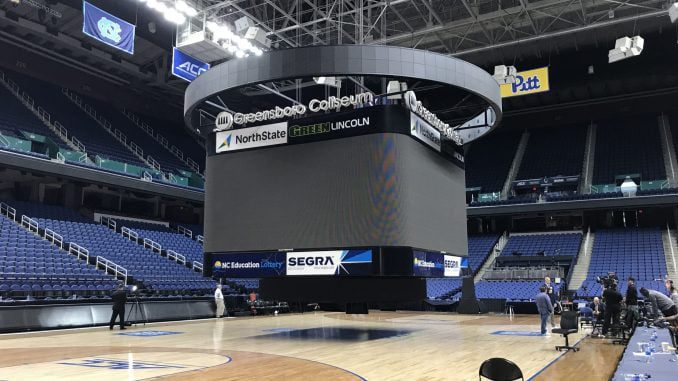
GREENSBORO — Darren Nix spent $800 on a pair of ticket books, took a week off from work and checked into a hotel to see his beloved NC State basketball team play in the ACC Tournament last week.
Then after just one session, he was informed that the rest of the tournament would be off-limits to fans before it was canceled altogether in response to the ongoing coronavirus crisis.
It was a stunning turn of events that left Nix and others like him, regardless of school affiliation, both disappointed and upset.
 “I haven’t been able to go to the tournament for five years because it’s been in New York and other places,” Nix, a lifelong Wolfpack fan from Garner who attended Jim Valvano’s basketball camp and worked at Reynolds Coliseum as a youngster, said shortly after receiving the news. “Now I’m not going to get to see the rest of the tournament.”
“I haven’t been able to go to the tournament for five years because it’s been in New York and other places,” Nix, a lifelong Wolfpack fan from Garner who attended Jim Valvano’s basketball camp and worked at Reynolds Coliseum as a youngster, said shortly after receiving the news. “Now I’m not going to get to see the rest of the tournament.”
Nix can take solace in the fact that the decision to halt play before the start of Thursday’s quarterfinal round was made in the interest of public health. And that virtually every other sports entity in the country has postponed or canceled their events in light of the spreading virus.
His financial hit will also be softened by refunds for tickets to all the games that weren’t played and nights in the hotel that weren’t used.
But it’s not the loss of time or money that bothered Nix most. It’s the uncertainty of when or even if he’ll get the chance to attend the tournament again.
Although Greensboro has been the site of more ACC Tournaments than any other venue — 27 if you count this one — there is no guarantee it will be back anytime soon.
If ever.
With sentiment growing among the newer conference members absorbed from the old Big East to anchor the conference’s signature event in major media markets such as New York, Washington, D.C., Atlanta and Charlotte, a movement championed by curmudgeonly Syracuse coach Jim Boeheim, this year’s tournament was looked upon as something of an audition to determine whether Greensboro was still a viable option moving forward.
Because it didn’t get that chance, the ACC owes it to the arena, the community that still embraces the conference like none other and, most of all, fans like Nix to return to the Gate City as soon as possible.
In a perfect world, that would be next year. But it’s unlikely the ACC would bring the tournament right back to Greensboro for a do-over because of the logistics involved. Since the 2021 tournament is already scheduled for Washington and the year after it’s back in Brooklyn, the earliest it could realistically return to Greensboro would be 2023.
That would seem to be a no-brainer.
And yet, when Swofford was asked directly about the possibility of a quick return to make things right for this year’s cancellation, the commissioner was ominously noncommittal.
“I don’t know the answer to that. We haven’t really discussed that,” he said. “On a personal basis, my heart bleeds for Greensboro. The decision that we have made will have quite an impact on this city, and this is where we were founded, this is where we live, this is where 27 ACC men’s tournaments have been played and 20 or so women’s tournaments, as well, and a lot of NCAA first and second rounds and even Final Fours.
“So there’s a tremendous basketball history. This town loves the ACC. This town loves college basketball. So I feel for the impact on the city.”
Feeling for it and doing what’s right are two different things, unfortunately.
Greensboro will lose an estimated $37 million in economic impact because of the tournament’s final three days of competition being canceled. Hotels, restaurants, store owners, Airbnb operators, Uber and Lyft drivers, and many others who would never have set foot inside the arena for a game will all feel the pinch.
That’s income they’ll never be able to recover.
The ACC, on the other hand, will be fine financially no matter where it goes. It can afford to reach out a helping hand to a city, a region and a fan base that have played such a significant role in its rise to prominence.
Times change and institutions evolve, but it’s important to never lose touch with your roots.
NASCAR did that a decade or so ago when it began to move races away from traditional tracks in Rockingham, North Wilkesboro and Darlington to trendier locations in other parts of the country. And it’s paying the price in the form of diminished attendance, ratings and revenue now that the novelty has worn off in those new areas.
The ACC would be wise not to make the same mistake by turning its back on its largest, most loyal group of benefactors.
People like Darren Nix.



